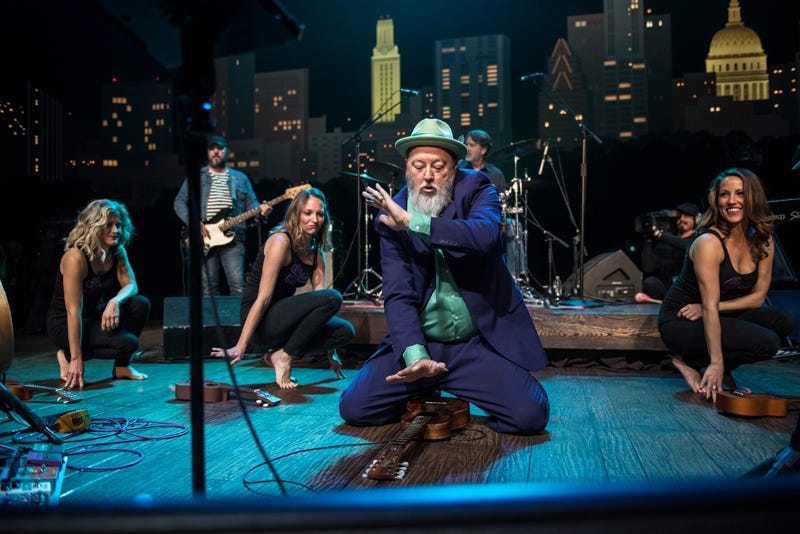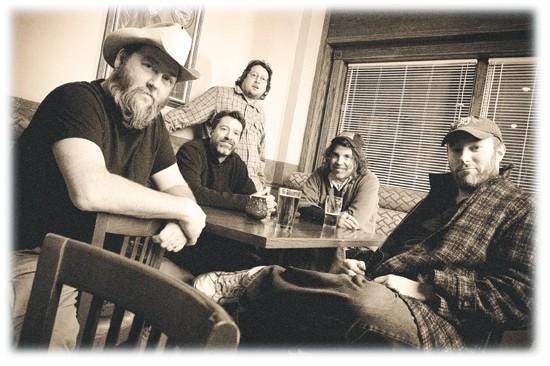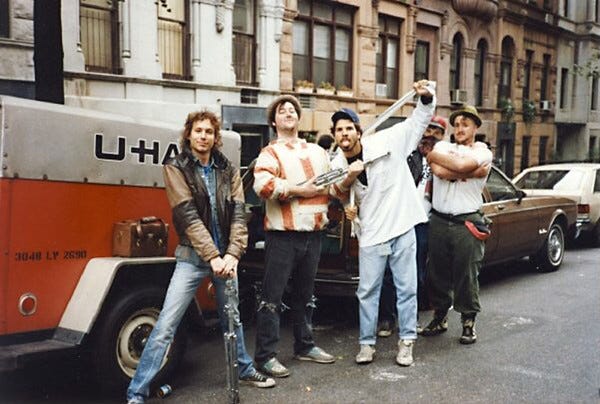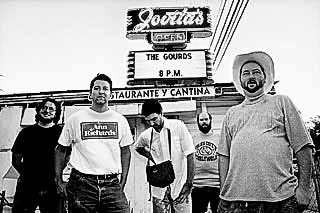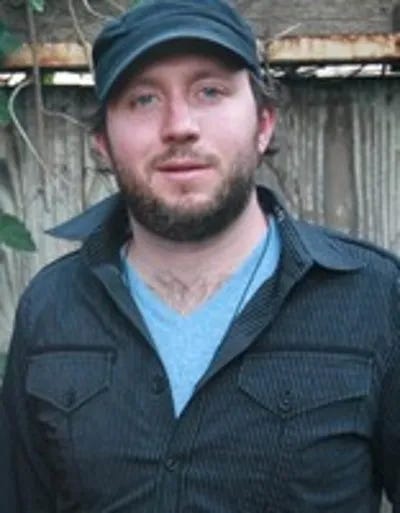Sometimes when you make an expensive purchase you take on a second job to pay for it. So when Kevin Russell of the Gourds bought his family a new car in 2007, he looked for a way to make about $500 a month on the side. Instead of throwing newspapers, Russell started Shinyribs, a solo project that played Houston bar Under the Volcano once a month.
While recording the 2010 debut LP Well After Awhile, Russell started assembling a four-piece band. But even more importantly, he started thinking that maybe he could survive as a working musician without the talented and successful band he co-founded in 1994 with bassist/singer Jimmy Smith.
The Gourds were going gangbusters at the time, recording the album Old Mad Joy at Levon Helms' studio in Woodstock, touring to a growing cult audience across the country, and being the focus of the terrific documentary All the Labor. They were in demand to play weddings and private parties, where they usually made $1,000 a man, enough for fiddle/ mandolin player Max Johnston to come down from Dallas.
"I really felt that the past five years of the Gourds, money became a main motivation," Russell said in 2013. Since the 1996 release of debut LP Dem's Good Beeble (which Russell calls the best Gourds album), the married band members fathered a combined 12 children and there were bills to pay.
But the creative high point of Russell's month was always Wednesday in Houston in front of 60 to 70 fans. He loved the freedom of running the whole show, of making up a setlist without debate, of singing his heart out without worrying that he might be upstaging the band. He describes his time with the Gourds, founded on a deal that he and Smith would split lead vocal and songwriting duties 50/50, as "a constant tug of war."
In 2013, Russell let go of the rope and took his wife’s brother, Gourds drummer Keith Langford, with him. The Gourds played their last show before an "indefinite hiatus," that’s become permanent, in late October that year at Threadgill’s South.
"The Last Stomp," was everything fans had hoped for. The band played in all sorts of configurations, with guest musicians and side bands, and did a bunch of songs they hadn't done in years. The sold-out crowd, many of whom flew in from all over the country on nine days notice, ringed the stage tightly, as their favorite band ended the four-hour party with a horn-heavy blowout of "Gin and Juice," followed by an encore of Smith's "Caledonia."
They hugged onstage, but the two factions- Smith and multi-instrumentalist Claude Bernard had a new band the Hard Pans- haven't really talked much since. "It was a wonderful show because it was that show, our last one," said Russell. It was a total lovefest!
In concert, Shinyribs never plays Gourds songs, not because Russell wants to keep that band in the past, but because, with the great followup LP Gulf Coast Museum, a more organic-sounding "band" record than the solo debut, there's enough Shinyribs material to fill an hour and a half, easy. They don't even have to play "Gin and Juice," the bluegrass take on Snoop Dogg that became the Gourds' "Free Bird." Instead, Shinyribs throws crowd-pleasing curves by covering "Waterfalls" by TLC or “All About That Bass” or Hendrix's "The Wind Cried Mary" with a lone ukulele.
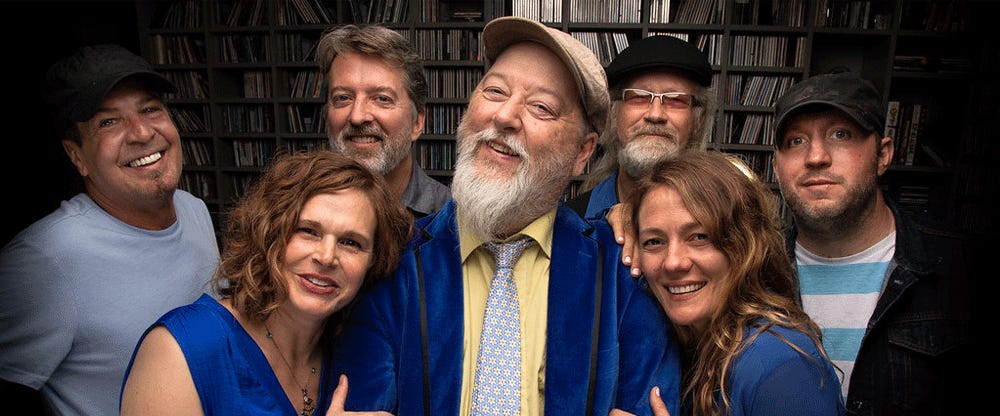
Russell, Langford, bassist Jeff Brown and keyboardist Winfield Cheek went back into the studio with producer George Reiff to record third album Okra Candy, whose title perfectly describes the band's sound of sweet and melodic Southern roots music. "I've really been invigorated by the acceptance of Shinyribs," said Russell, who's been a prolific songwriter since his teenaged days in Beaumont, where his father worked in the oil supply business.
When Shinyribs added the Tijuana Trainwreck Horns and the Shiny Soul Sisters for 2017’s I Got Your Medicine, they became a powerhouse swamp funk band with a wildly-dancing front man. Unless you don’t like conga lines, their Austin City Limits taping in 2018 was one of the best-ever by a local band.
Russell’s road to 'ribs began as a teen in Shreveport, where his father's job took him. He worked at Johnny’s Pizza in high school and started a band with co-worker David Green, a drummer. Picket Line Coyotes were a sort of punkier Elvis Costello, and when they opened for Austin bands passing through, Russell and co-horts would invariably hear that they needed to get down to A-town. "We had people in Shreveport and this was in the era of the 55 miles per hour speed limit and it took forever to drive from Shreveport to Austin," he said. So the band moved to Dallas in 1988 as a midpoint. Rob Bernard, later of Prescott Curlywolf and the Damnations, played guitar.
When the PLC bassist got married and settled down, a Plano kid named Jimmy Smith auditioned for the job and got it. "It was actually George Reiff who sent him our way," said Russell. Smith tried out as guitarist for Reiff’s Big Loud Dog, but when he admitted he was really a bass player, but desperately wanted to be in a band on the Deep Ellum scene, George sent him the Coyotes’ way. "Jimmie was the fresh blood we needed," Russell said. "He was this really great bass player with tons of enthusiasm. We would've broken up if it wasn't for him."
Smith was a quirk, a wounded jughead with a poet's soul and a hobo/fabulous fashion sense, who wrote songs of a structure all their own. He made the band more interesting, for sure.
The Coyotes moved down to Austin in 1991 and did, eventually, break up. Before the Gourds were the Grackles. But regardless of what they were called, there was a stark new direction in the songs that Russell was writing. He became infatuated with the work of John Lomax, the Austin-based musicologist who hunted indigenous music all over the world with his son Alan. His band started being compared to The Band more than Graham Parker and the Rumour.
The Steamy Bowl, as Smith called his East Hyde Park party/jam house, was where Claude Bernard (brother of Coyote guitarist Rob), original drummer Charlie Llewellin, Smith and Russell first started experimenting as the Gourds in 1994. The band and their friends would get together on Bottle Night, pooling their money for quarts of hooch, then jamming until the sun came up. New songs were sketched out with Sharpies on the walls.
The way you fell in love with the Gourds was to be mildly impressed the first time you saw them, then one night you’d stumble into a transcendent Gourds set, when the right covers, like "Ramblin' Man" by the Allman Brothers (as if done by JJ Cale) come at the right time, and the originals sound like easy gifts of pure instinct. On those nights they were the best band in America.
Russell said the Gourds song that most led to Shinyribs was "Promenade" from 2006's Noble Creatures. It's a beautifully sung ballad with minimal accompaniment that the Gourds almost never played live. "The other guys just couldn't seem to get behind that one," Russell said, "and I thought that was one of the best songs I'd ever written with the group."
Russell also started writing on the ukulele more, which didn't seem to gel with the mandolin-driven material the Gourds are known for. "Some Shinyribs songs, like 'Country Love,' became Gourds songs, but most of them I'd just keep on the side. They were for something else."
They were for a new band as satisfying as the Gourds, if singing and songwriting are your things. The arrangements are more direct, the lyrics more linear. Shiny songs sound like you could hear them on the radio if such a world still existed. Or ever did.
The Gourds made do without much radio or any of the social media Shinyribs works so well. This five-piece country/rock/folk/kitchen/sink caravan was tagged “Austin’s best band” for so long the designation became almost boring. The Gourds were not defined by a cool Snoop cover, but a sturdy torso of material that sweats through its work clothes.
Dem's Good Beeble laid the blueprint for organic freshness and consistent insight- dark themes and light touches- that would mark the band's recorded output. You have to go back to the Crickets to find a Texas band with a five-year output that tops 96’s Beeble, Stadium Blitzer (1998), Ghosts of Hallelujah (1999), Bolsa de Agua (2000) and 2001’s Shinebox.
The "fraternity of curmudgeons," as Russell called the veteran group, developed the instinctive language of motion you'd find with a playoff basketball team. But the chemistry didn't always come easy, especially off-court.
Smith’s whacked-out soul chanties gave the band a split personality when paired with Russell's crusty roots strolls, which were more popular (especially “El Paso” from Bolsa, a KGSR staple.) But a deal is a deal and there was tension. Both wanted the ball when the game was on the line.
One night backstage at Stubb’s around ‘98, the pair had a two-word exchange that said everything. "Uptight," Smith uttered leaving the room. "Freak," Russell answered. It’s almost a miracle that the Gourds went on for another 15 years.
Signing up Max Johnston (ex-Uncle Tupelo) before Ghosts helped link the co-frontmen, with his wicked fiddle adding a layer of weirdness to Russell's songs and an earthy feel to Smith's odd rants. Still, it seemed, as Smith put it, the co-leaders "were just sharing a band."
Though I loved some of Jimmy’s songs- “Plaid Coat,” “Layin’ Around the House,” “County Orange” and “All the Labor” - and his unmatchable bass-playing, I was a co-captain of Team Kev.
In my 38 years of Austin, I’d pick Kevin Russell as the most all-round-talented hometown musician. Let’s see Joe Ely play guitar like Russell, or Erik Hokkanen match Levon Helm’s DNA on vocals or Adrian Quesada better cover “Stayin’ Alive” on the ukulele while waiting to pick up the kids at school. Certainly no songwriter has been so prolific. And he can dance like nobody’s business!
But it’s a shame the Gourds have not played again- and never will- after that last jamboree at Threadgill’s in 2013.
On an even sadder note, original Shinyribs bassist Jeff Brown passed away in July 2021 from complications due to epilepsy. He was 42 and had just released the record “After the War” with his heartfelt “side-project” the Savage Poor, which also featured Shinyribs drummer Keith Langford.
Listen to it here.
Coupled with the momentum-killing pandemic, Shinyribs has had a tough couple years, but they’re back at it in top form, thrilling a fanbase heavy with horny housewives and thrill-seeking empty-nesters. They’re playing Old Settler’s, where they’ve been kinda like the Neville Brothers at Jazzfest, on Saturday April 23 and the next afternoon on the campground stage where the magic really happens.



